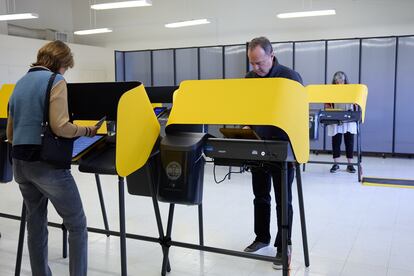Former baseball star enters battle for Sen. Dianne Feinstein’s seat in California
Donald Trump and Joe Biden won comfortably in the state on Super Tuesday, and are one step closer to clinching the presidential nomination


Steve Garvey, a 75-year-old former baseball star, is hoping to score a surprise win for California Republicans. The former Dodgers player has advanced in the Super Tuesday primaries to the November special election. That’s when voters will decide who will fill the Senate seat of legendary Dianne Feinstein, who died last September having been in office since 1992. Garvey will be up against Democrat congressman Adam Schiff, who was a central figure in the first impeachment process against Donald Trump.
On Tuesday night, with 39% of the vote counted, Schiff had won more than one million votes (34%) while Garvey scored 933,000 (30%). It was a very tight race among the Democrats. Schiff was running against two fellow representatives, progressives Katie Porter and Barbara Lee, who won 17% and 9%, respectively. In California, all candidates compete against one another, and the two most-voted candidates of the night advance to the November vote, regardless of whether they are from the same party.
This style of election has prompted the Democrats to try new strategies to reduce friendly fire. Schiff’s campaign, for example, invested about $10 million in advertising against Steve Garvey. In his ads, the congressman linked the Los Angeles Dodgers star to Donald Trump and right-wing policies. But this gave Garvey — who entered the race last, in October — more visibility. With the publicity, he also hinted that Garvey was the rival to beat in the liberal bastion.
Congresswoman Porter, who became popular for her didactic interventions in the House of Representatives, accuses Schiff of using that strategy to avoid competing with her in November. Laphonza Butler, a union activist, was appointed last fall by California Governor Gavin Newsom to fill Feinstein’s Senate seat. But Butler announced that she would not run in the election, leaving Schiff, Porter and Lee to compete in the close race.
Polls indicate it will be an easy campaign for Schiff, a former prosecutor who has been representing the city of Burbank, north of Los Angeles, for years. Surveys indicate that he has 53% of support, compared to Garvey’s 38%. California has 22 million registered voters. A total of 43% are registered Democrats, while 24% are Republicans. California has not elected a Republican to statewide office since 2006.
Garvey celebrated the results at an event in the city of Palm Desert, east of Los Angeles. “This is the first game of a doubleheader, so keep the evening of Nov. 5 open,” he told his supporters. “Because we will celebrate again.”
Biden and Trump win comfortably
The Republican and Democratic presidential primaries in California were won quickly and without surprises. It took less than 15 minutes after polls closed for news networks and AP to declare Joe Biden and Donald Trump the winners of the state, which is the biggest prize of Super Tuesday.
California is sending 424 Democratic delegates to the party’s convention, which will be held in Chicago in August. The state follows a winner-takes-all model, meaning the delegates are not awarded in proportion to how many votes each candidate won. Biden is 679 away from reaching the magic number of 1,968 to secure the nomination.
On the Republican side, Trump is approaching his third presidential nomination after winning the 169 delegates at stake in California. Projections indicate that the former president can secure his party’s candidacy on March 12, when the states of Georgia, Washington, and Mississippi hold their primaries.
Sign up for our weekly newsletter to get more English-language news coverage from EL PAÍS USA Edition
Tu suscripción se está usando en otro dispositivo
¿Quieres añadir otro usuario a tu suscripción?
Si continúas leyendo en este dispositivo, no se podrá leer en el otro.
FlechaTu suscripción se está usando en otro dispositivo y solo puedes acceder a EL PAÍS desde un dispositivo a la vez.
Si quieres compartir tu cuenta, cambia tu suscripción a la modalidad Premium, así podrás añadir otro usuario. Cada uno accederá con su propia cuenta de email, lo que os permitirá personalizar vuestra experiencia en EL PAÍS.
¿Tienes una suscripción de empresa? Accede aquí para contratar más cuentas.
En el caso de no saber quién está usando tu cuenta, te recomendamos cambiar tu contraseña aquí.
Si decides continuar compartiendo tu cuenta, este mensaje se mostrará en tu dispositivo y en el de la otra persona que está usando tu cuenta de forma indefinida, afectando a tu experiencia de lectura. Puedes consultar aquí los términos y condiciones de la suscripción digital.








































